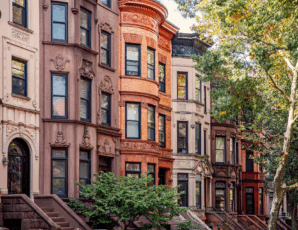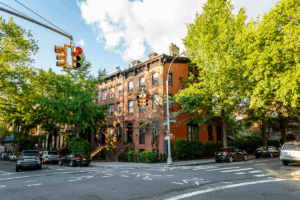Home sale prices in both Manhattan and Brooklyn are on the rise going into the home shopping season, up about 5 percent in Brooklyn and just over 1 percent in Manhattan, according to the February 2017 StreetEasy Market Reports[i]. In both boroughs, the lower-priced submarkets experienced the most price growth. The median resale price in East Brooklyn rose 11 percent since last February and almost 8 percent in Upper Manhattan.
This year’s home shopping season will be made up of rising prices, low inventory and fewer price cuts than a year ago, painting a competitive picture for buyers this spring.
From StreetEasy Senior Economist Grant Long:
“Low inventory coupled with strong demand is the perfect mix for a competitive housing landscape and that’s what this home shopping season is shaping up to be. Buyers shopping in areas where homes are still relatively affordable, such as Upper Manhattan and East Brooklyn, should be prepared to move quickly on a home when they find the right fit.
Even though prices are on the rise, growth is still much slower than in years past and may level off in coming months. The skyline is filled with cranes. More homes will be coming on the market, which will likely ease price appreciation, bringing some relief to prospective buyers, especially those interested in higher price points.”
Sale Prices Rise the Most in East Brooklyn, Northwest Brooklyn and Upper Manhattan
- In Manhattan, the median resale price[ii] rose 1.3 percent year-over-year to $990,142.
- The median resale price rose in all Manhattan submarkets except Downtown, which fell 1 percent since last February.
- The median resale price rose the most in the Upper Manhattan submarket, up 7.8 percent year-over-year to $673,874, which includes neighborhoods such as Harlem, Washington Heights and Inwood.
- The median resale price rose 2.8 percent in the Upper East Side submarket, followed by 1.3 percent in the Upper West Side submarket and 0.2 percent in the Midtown submarket.
- In Brooklyn, the median resale price rose 5.2 percent year-over-year to $569,429.
- The median resale price rose in all Brooklyn submarkets except North Brooklyn, which includes Williamsburg and Greenpoint, decreasing 4.4 percent year-over-year.
- The median resale price rose the most in East Brooklyn, up 11 percent since last February to $492,688. The median resale price rose 9.4 percent in Northwest Brooklyn, 6.1 percent in South Brooklyn and 3.4 percent in Prospect Park.
[tableau server=”public.tableau.com” workbook=”priceIndices” view=”StreetEasyPriceIndex” tabs=”no” toolbar=”no” revert=”” refresh=”yes” linktarget=”” width=”600px” height=”820px”][/tableau]
Inventory Shortages and Fewer Price Cuts Going into Home Shopping Season
- In Manhattan, there are 6.8 percent fewer homes on the market than a year ago.
- Home shoppers will have fewer homes to choose from than last year in all Manhattan submarkets. Upper Manhattan reported the greatest drop in inventory, with 23.4 percent fewer homes to choose from than a year ago.
- In Brooklyn, there are actually 2 percent more homes on the market than a year ago, but buyers will have 19.7 percent fewer homes to choose from in Northwest Brooklyn and 11.7 fewer in East Brooklyn.
- In Manhattan, 38.3 percent of homes had their listing price cut in February, down from a peak of 45 percent in September 2016.
- In Brooklyn, 26.1 percent of homes had their listing price cut, down from a high of 32 percent.
[tableau server=”public.tableau.com” workbook=”Feb2017SalesInventoryChange” view=”Dashboard1″ tabs=”no” toolbar=”no” revert=”” refresh=”yes” linktarget=”” width=”600px” height=”720px”][/tableau]
Median Rent Falls $70 in Manhattan and $130 in Brooklyn
- Manhattan’s median rent[iii] fell 0.3 percent year-over-year to $3,199.
- Brooklyn’s median rent also fell, down 2.6 percent year-over-year to $2,787.
- Rents are down from their August 2016 peak by an average of $70 per month in Manhattan and $130 per month in Brooklyn.
- Rents declined the most in North Brooklyn, falling 8.2 percent since last February to $2,906. Rents also fell in Northwest Brooklyn, Midtown Manhattan and the Upper East Side submarkets.
- Rents rose the most in the Upper Manhattan submarket, up 3.5 percent year-over-year to $2,392.
[tableau server=”public.tableau.com” workbook=”Feb2017MarketOverview” view=”NeighborhoodData” tabs=”no” toolbar=”no” revert=”” refresh=”yes” linktarget=”” width=”600px” height=”870px”][/tableau]
[i] The StreetEasy Market Reports are a monthly overview of the Manhattan and Brooklyn sales and rental markets. Every three months, a quarterly analysis is published. The report data is aggregated from public recorded sales and listings data from real estate brokerages that provide comprehensive coverage of Manhattan and Brooklyn, with most metrics dating back to 1995 in Manhattan and 2005 in Brooklyn. The reports are compiled by the StreetEasy Research team. For more information, visit http://streeteasy.com/blog/market-reports/. StreetEasy tracks data for all five boroughs within New York City, but currently only produces reports for Manhattan and Brooklyn.
[ii] Median resale price is measured by the StreetEasy Price Indices. Also referred to as the StreetEasy Manhattan Price Index (MPI) and StreetEasy Brooklyn Price Index (BPI), the metrics are monthly indices that track changes in resale prices of condo, co-op, and townhouse units. Each index uses a repeat-sales method of comparing the sales prices of the same properties since January 1995 in Manhattan and January 2005 in Brooklyn. Given this methodology, each index accurately captures the change in home prices by controlling for the varying composition of homes sold in a given month. Data on sales of homes is sourced from the New York City Department of Finance. Full methodology here: http://streeteasy.com/blog/methodology-streeteasy-price-indices/
[iii] Median rent is measure by the StreetEasy Rent Indices, which are monthly indices that rack changes in rent within all housing types using a similar repeat-sales method as the StreetEasy Price Indices. Median rent price change is monitored between all rental pairs in a given geography. Full methodology here: http://streeteasy.com/blog/methodology-streeteasy-rent-indices/








